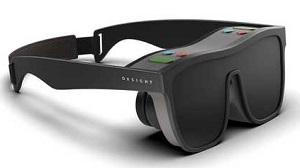Charities & Support Groups
New smart glasses help people with macular disease to read, recognise faces and identify objects
New smart glasses help people with macular disease to read, recognise faces and identify objects
Macular Society members are among 122 people from three countries who tested the latest smart glasses from OXSIGHT.

OXSIGHT’s Onyx are specifically designed for those with central vision loss, and volunteers for the study were assessed on their ability to perform three core tasks – reading, face perception and object identification.
The findings reveal:
reading ability significantly improved for 86 per cent of participants
facial recognition and object identification significantly improved for three out of four people
the greatest benefits were experienced by those with the lowest visual acuity.
An even split of male and female volunteers were involved in the trial, with an average age of 71. Over two thirds of them had age-related macular degeneration (AMD).
How it works
The glasses capture images with a camera and display them on bright, colour-rich screens. Users can pause and magnify images up to eight times, and use computer vision detectors to find and highlight faces and text.
Dr Michael Crossland PhD MCOptom DipRVI, Specialist Optometrist in Low Vision and UCL Hon. Senior Research Associate at the world-leading Moorfields Eye Hospital, said: “I’m very excited about the OXSIGHT Onyx low vision device. Assistive technology is already helping many of our patients with moderate to severe visual impairment, but current devices are limited by their weight, cosmetic appearance, non-intuitive controls, and lack of versatility. For example, some only work for one task, and others cannot be worn whilst walking.
“The OXSIGHT Onyx device has addressed many of these concerns and has clearly been designed with visually impaired people in mind. I think it will provide a more affordable, more versatile, more lightweight solution for many of the people I see with visual impairment, and will enable more people to maintain independence, to study, to work, and to avoid social isolation.”
Nathan Tree, a visually impaired GB ice hockey player, was one of the first to trial OXSIGHT Onyx. He said: “I put the glasses on and I could read – something I haven’t been able to do for many years.
“Day-to-day, the glasses help by adding detail to things. I can’t watch live sport at the moment because it moves too fast and I can’t see enough when I go to galleries or museums. The glasses will help with cultural things like that.
“I have a large print keyboard on my desk and I can barely see it now. With the glasses, I can see the whole thing. I can read the ingredients on food packets and they’re really helpful to read a menu.
“These glasses will make life better for many people.”
What next?
Following the trials, the smart glasses are being fine-tuned and should be ready for manufacture in summer 2021
Information from The Macular Society…pleased to support
























